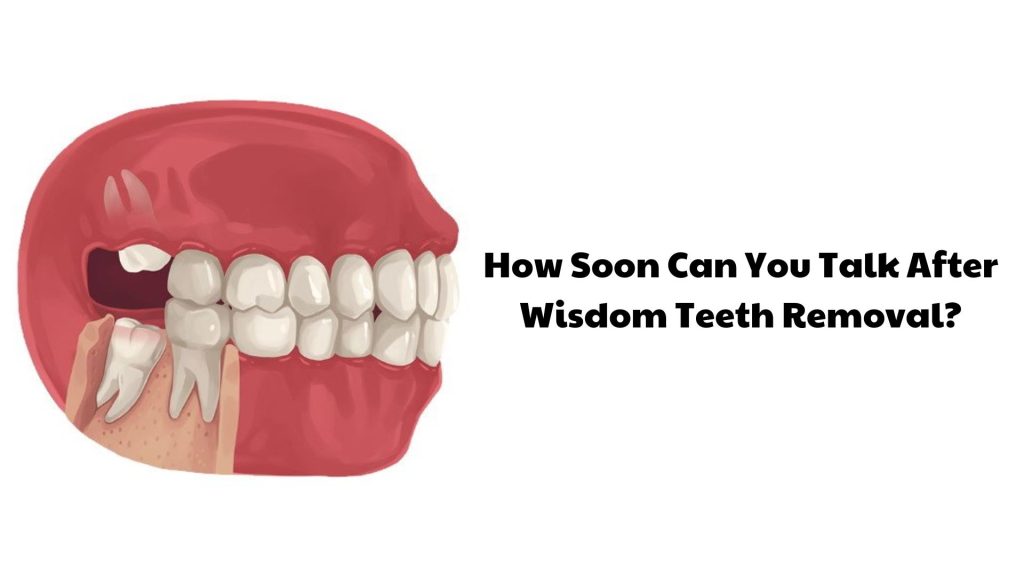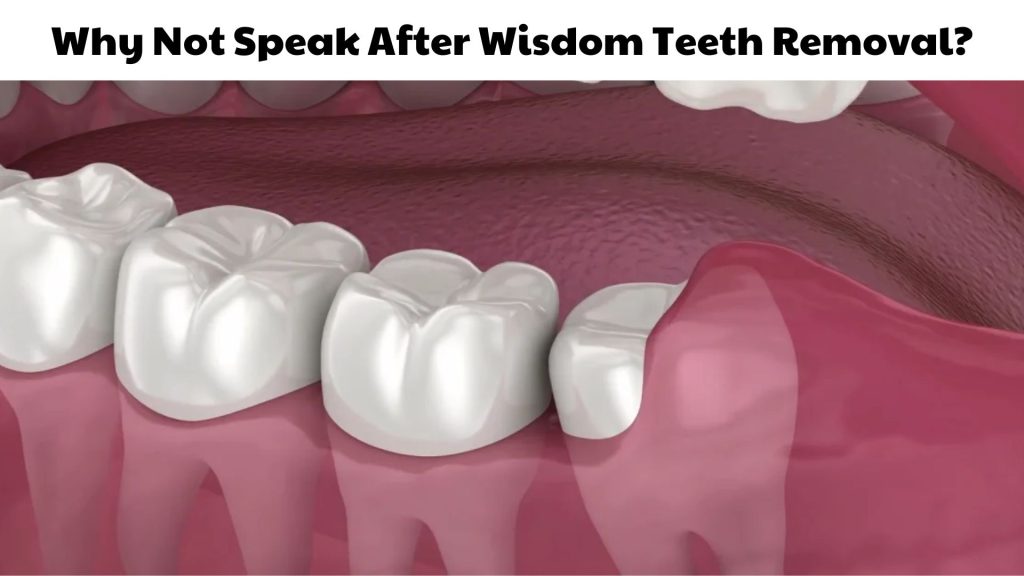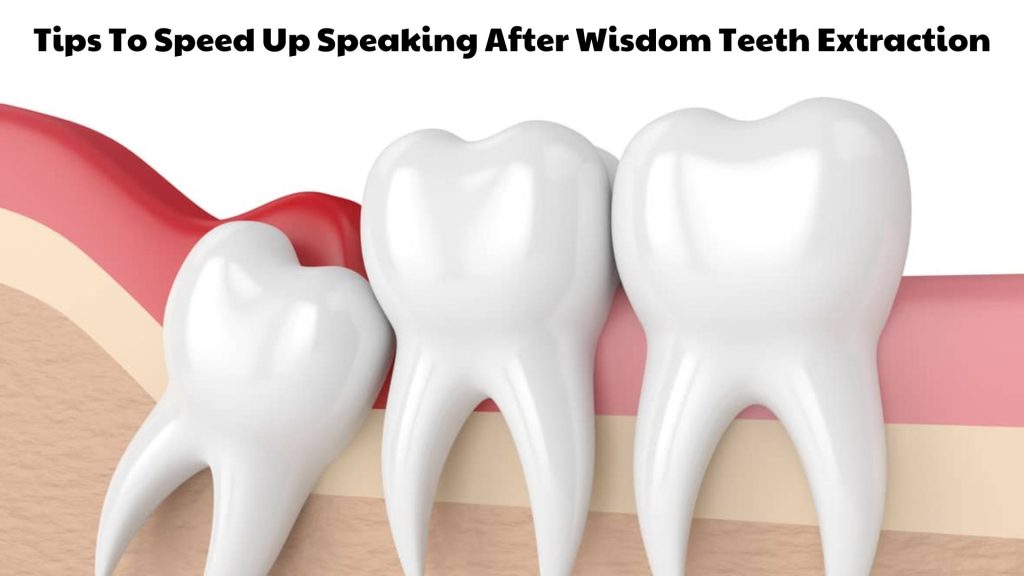How soon can you talk after wisdom teeth removal? In the first 24-48 hours, swelling and discomfort will make speech harder but still doable. Slow, soft speech. Wisdom teeth extraction is frequent, but recuperation takes specific care. People often ask, “When can I return to speaking normally?” following wisdom teeth removal. This impacts communication in everyday life and work. This article discusses wisdom teeth extraction recovery and how long you should wait to talk normally.
How Soon Can You Talk After Wisdom Teeth Removal?


How long it takes to be able to speak normally again after getting a wisdom tooth taken out varies on the person and the surgery. Don’t speak or move your numb lips after surgery to avoid bleeding or harm.
For the first 24–48 hours, speak less and softly. During this period, you may communicate by text messages or notes.
After approximately 48 hours, the discomfort and stiffness will begin to fade, and you will be able to talk more clearly and softly. To help it get better, try not to use your voice too much.
After a week, many individuals may feel strong enough to speak correctly again.
However, some people may need more time to recover, and you should always listen to and follow the advice of your doctor and dentist to ensure a safe and rapid recovery.
Factors Affecting Wisdom Teeth Extraction Talking Recovery
After getting your wisdom teeth out, you may find it difficult to speak for a while. We need to look at the components that might impact this process to better understand why healing times differ from person to person:
- Surgical complexity: The intricacy of wisdom teeth extraction depends on its location, form, and whether new blood arteries are needed. Complex surgery may take longer to heal.
- Age: The speed of healing can be affected by age. Most of the time, younger people get better faster than older people.
- Overall health: If you have good overall health, your immune system is stronger, making recovery faster.
- Following instructions: Please follow your doctor’s or dentist’s advice. Proper oral hygiene might speed up recuperation.
- Presence of complications: If there are issues after surgery, such as infection or significant edema, recovery time may be extended since this issue must be addressed first.
- Personal factors: Each individual has unique baseline features, such as self-healing speed and pain thresholds.
Keep in mind that everyone heals differently after having their wisdom teeth out.
Why Not Speak After Wisdom Teeth Removal?


After wisdom teeth extraction, it is important to maintain your mouth and surgery region in excellent condition to enable a smooth recovery and minimise any issues. Here are some reasons why you should avoid speaking immediately after wisdom teeth extraction:
Unstable Oral Condition
When the mouth is still sensitive after surgical recovery, speaking might lead to the following issues:
- Pressure: Prolonged mouth movement and voice use might put a strain on the surgery site. This may cause bleeding or surgical site harm.
- Swelling and pain: Talking too much may induce mouth swelling and discomfort, making rehabilitation difficult and painful.
- Potential deconditioning: If you are under deconditioning or anesthesia during surgery, chatting may interfere with the deconditioning, leading you to wake up sooner than intended and creating pain.
Thus, restricting speech and keeping your mouth free after wisdom teeth extraction is advised by your doctor and dentist to preserve the oral region and ease recuperation. The first several hours following surgery are tranquil.
Risk Of Infection
You shouldn’t talk right away after getting your wisdom teeth out because you could get an infection. The extraction of your wisdom teeth will cause mouth wounds. If you speak a lot and exert pressure on your mouth, germs from your mouth may enter the wound or surgery site, increasing the risk of infection. If saliva gets contaminated, germs might enter the surgical region. Limit your talking and follow your doctor’s or dentist’s advice to ensure a smooth recovery and prevent infection.
During healing, it’s important to keep your mouth clean and not put pressure on the area where the surgery was done.
Potential Nerve Damage
There is a link between the incapacity to talk quickly after wisdom teeth extraction and the risk of nerve damage. Sometimes the wisdom tooth root is near to a nerve in the mouth. Talking or putting pressure on the operation region might put a strain on this nerve, causing discomfort and injury.
So, to avoid jarring your nerves and ensure a speedy recovery, speak less and keep your lips shut for at least the first few hours following wisdom teeth extraction. It’s critical to follow your doctor’s and dentist’s instructions when recovering from surgery.
Do You Notice Any Speech Issues Following Wisdom Teeth Extraction?
A range of symptoms may indicate difficulty recovering speech after wisdom teeth extraction. If you detect any of these symptoms, contact your doctor or dentist immediately for advice and examination:
- Long-lasting pain and edoema.
- Sensational impairment or tissue injury.
- The inability to communicate persists.
- Long wisdom teeth recovery.
Always talk with your doctor if you have any concerns regarding your speech recovery after having your wisdom teeth out; every patient’s situation is unique.
Tips To Speed Up Speaking After Wisdom Teeth Extraction


There are several crucial steps you may take to speed up the talking process following wisdom teeth extraction and guarantee a successful recovery.
First and foremost, always follow your doctor’s or dentist’s instructions and suggestions. This guarantees that you adhere to correct dental care and healing procedures. Maintaining a clean mouth region with a saline solution or mouthwash is critical for preventing infection and hastening healing.
Also, obtain adequate rest and sleep to assist your body’s recovery and prevent weariness. To reduce edema, use cold for the first 24 hours following surgery before transitioning to warming to promote blood circulation. In the days after surgery, soft, non-mashing food may also assist in minimizing strain on the operative region. Other critical precautions to guarantee safety and success throughout the healing process following wisdom teeth extraction include limiting the use of your voice and avoiding smoking and drinking.
Finally, if needed, you might practice oral muscle exercises following surgery to improve flexibility and control of your mouth muscles.
Post-Wisdom Teeth Removal Speech Recovery Exercises
Restoring the capacity to speak after recuperation from wisdom tooth removal may be difficult. However, there are several basic exercises and practices that may assist in enhancing this process and make returning to regular speaking simpler. Here are several examples:
Oral Muscle Exercises
After having your wisdom teeth out, you may find that your speech rehabilitation is aided by oral muscle exercises that increase flexibility and control of the oral muscles. Try out these other types of oral practice:
- Open and close your mouth: Widen your mouth and shut gently. Repeat this many times to develop controlled mouth opening and shutting.
- Remove and insert your tongue: Pull your tongue as far out as you can while keeping your mouth closed. After that, insert your tongue inside your mouth. Rep this method to concentrate on tongue control.
- Speak more slowly: Slow down and say a short word or phrase. This clears your voice and enhances pronunciation.
Remember that these activities need patience and time to complete. If you have any questions or concerns regarding regaining speech following wisdom teeth removal, it is always advisable to address them with your medical expert.
Focus On Pronunciation
Tongue exercises may aid in the process of regaining speech following wisdom teeth removal. The tongue is an integral aspect of the process of sound word production and speech. You may enhance your pronunciation and confidence while talking by concentrating on how to arrange your tongue in various places in your mouth and get greater control of your tongue.
Furthermore, the capacity to control the tongue is required for modifying the tone and tone of the voice. After wisdom teeth removal, regular practice and patience in exercising your tongue might help you regain your capacity to talk more efficiently. You should talk and seek advice from your doctor or a professional in the area of speech and language for further specifics and precise instructions.
When Should You See Your Dentist?
While removing wisdom teeth is a frequent dental procedure, it is important to take your time and pay close attention to your healing afterward. People who have had wisdom teeth removed worry about speaking following surgery. If you’re worried about speaking following wisdom teeth removal, visit the Spring Orchid dental facility.
At Spring Orchid Dental, we remove wisdom teeth securely and properly and care for your recuperation. We provide personalized care to promote a smooth and successful recovery since we know everyone has different demands and health problems. confidence to speak again.
So, call us promptly if you have speech problems, edema, or infection following wisdom teeth extraction. We have qualified dental professionals and surgeons to assess and treat any condition. At Spring Orchid Clinic, we strive to provide you with the greatest surgery and recuperation experience so you may live confidently.
FAQs
Can I Talk After Wisdom Tooth Removal If I Work In Communication?
For everyday communicators, speaking after wisdom teeth removal might be difficult. Recovery after wisdom teeth surgery may take days to weeks, with early symptoms including swelling, discomfort, and trouble opening your mouth. This may impair speech.
However, Discuss this with your dentist before having your wisdom teeth removed to promote a smooth recovery and speech. Work and everyday communication demands will be heard. Your dentist may propose the finest wisdom teeth extraction and healing technique for you. Follow your post-operative follow-up plan because your dentist will monitor your healing and provide you with special recommendations. If feasible, alter your job while recuperation and use mobile applications or note-taking to communicate through tough periods following surgery.
Most importantly, you and your dentist must collaborate to optimize recuperation and communication.
Does Wisdom Tooth Extraction in Australia Count As Paid Leave?
Each Australian company’s leave policy determines whether wisdom teeth extraction constitutes paid leave. Under Australian employment law, workers have the right to take paid “sick leave” if they need to go to the doctor or have surgery. Wisdom teeth extraction may be deemed medical leave and included in income depending on business policy and your labor agreement.
For information about authorized leave for wisdom teeth extraction, see corporate policy or human resources. This clarifies your rights and duties and medical leave processes.
When May I Resume Regular Activities Following Wisdom Teeth Removal?
Your dentist or oral surgeon will tell you when you may return to regular activities after wisdom teeth removal surgery. However, here are some rough estimates for downtime:
- First phase (first day after surgery): Rest and avoid heavy exertion during this period. After surgery, your dentist may recommend 1-2 days off work. You should also avoid driving and drinking.
- Medium phase (after 2-7 days): Swelling and pain will decrease, but rest and avoid strenuous exertion. Soft foods and avoiding hard ones may be suggested.
- Full recovery period (after several weeks): Full recovery takes time and varies by person. After weeks, swelling and pain will subside, enabling you to resume normal activities.
The advice of your dentist or oral surgeon should come first. They’ll keep an eye on how you’re doing and provide you specific guidance on when you can go back to business as usual.





